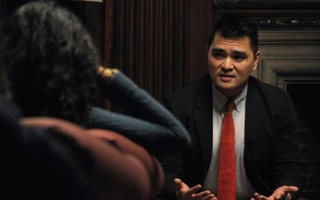The shake-up in Washington yesterday has made waves that will soon make their way to Cambridge.
The Republican Party’s gains in the House and Senate will have significant effects on the status of issues like the Don’t Ask, Don’t Tell policy and the Development, Relief, and Education for Alien Minors Act—policies that deeply concern Harvard.
Kevin Casey, Harvard’s associate vice president for communications and public affairs, echoes the idea that the results of the midterm elections will have great influence on these policies.
“If there is a leadership change, then agendas can shift dramatically,” he says.
ROTC ON CAMPUS
University President Drew G. Faust says that Reserve Officer Training Corps’ return to campus is predicated on the repeal of Don’t Ask, Don’t Tell, but with yesterday’s conservative gains in Congress, that seems to be an unlikely outcome.
Harvard currently does not officially recognize ROTC because Don’t Ask, Don’t Tell violates the school’s anti-discrimination policy.
Recently, Massachusetts Senator Scott P. Brown publicly blasted Faust for the University’s policy on ROTC.
While Faust says she looks forward to a repeal of Don’t Ask, Don’t Tell, Harvard’s position is unlikely to carry weight in Washington, according to Nathaniel G. Butler ’68, a Navy veteran and board member of the Harvard Gay and Lesbian Caucus.
The House of Representatives already passed a version of an appropriations bill that would repeal Don’t Ask, Don’t Tell. If the Senate makes any changes to the bill, then the House will be required to pass the bill again.
But Arizona Senator and former Republican presidential nominee John McCain says that he would lead a filibuster in the Senate to prevent the repeal of Don’t Ask, Don’t Tell. Although the Democrats held on to a majority in the Senate, they do not have the 60 votes required to break a filibuster.
“Ultimately these members of Congress will look like they supported discrimination,” says Robert Greenwald, managing director of the Law School’s Legal Services Center. “Time and history will show that the right thing to do is repeal Don’t Ask, Don’t Tell.”
If the law is not repealed in Congress, it can be decided on in the court system. According to Law School professor Michael J. Klarman, the law is based on prejudice against LGBT people and “that’s not a sufficient justification for sustaining a law under well-established constitutional doctrine.”
According to Greenwald, the election of a more conservative House yesterday reflects the country’s views on economic policy, rather than its opinion on Don’t Ask, Don’t Tell.
The majority of people in the United States support the repeal of Don’t Ask, Don’t Tell, but the fiscal mood of the country pushed voters to chose more conservative candidates, according to Greenwald.
Read more in News
Deval Patrick Reelected Mass. Governor, Wins Cambridge and BostonRecommended Articles
-
Misguided RemarksSen. Brown should exercise greater prudence before he chooses to conflate Harvard's policies
-
DREAM Act To Come Before SenateThis week may be the U.S. Senate’s last chance to pass a bill that would grant amnesty to undocumented students before Congress’ term ends and a Republican majority takes over the House of Representatives.
-
Senate Further Delays DREAM Act ReviewThe Senate voted yesterday to table the bill that would grant some undocumented students a conditional path to citizenship Wednesday.
-
 Senate Repeals DADT, Stalls on DREAM Act
Senate Repeals DADT, Stalls on DREAM Act -
Students Rally for DREAMA group of Harvard students and community members gathered on the steps of Widener Library Saturday afternoon to show support for the Development, Relief, and Education for Alien Minors Act.
-
 Harvard College Act on a Dream Hosts Conference on Immigration Reform
Harvard College Act on a Dream Hosts Conference on Immigration Reform












